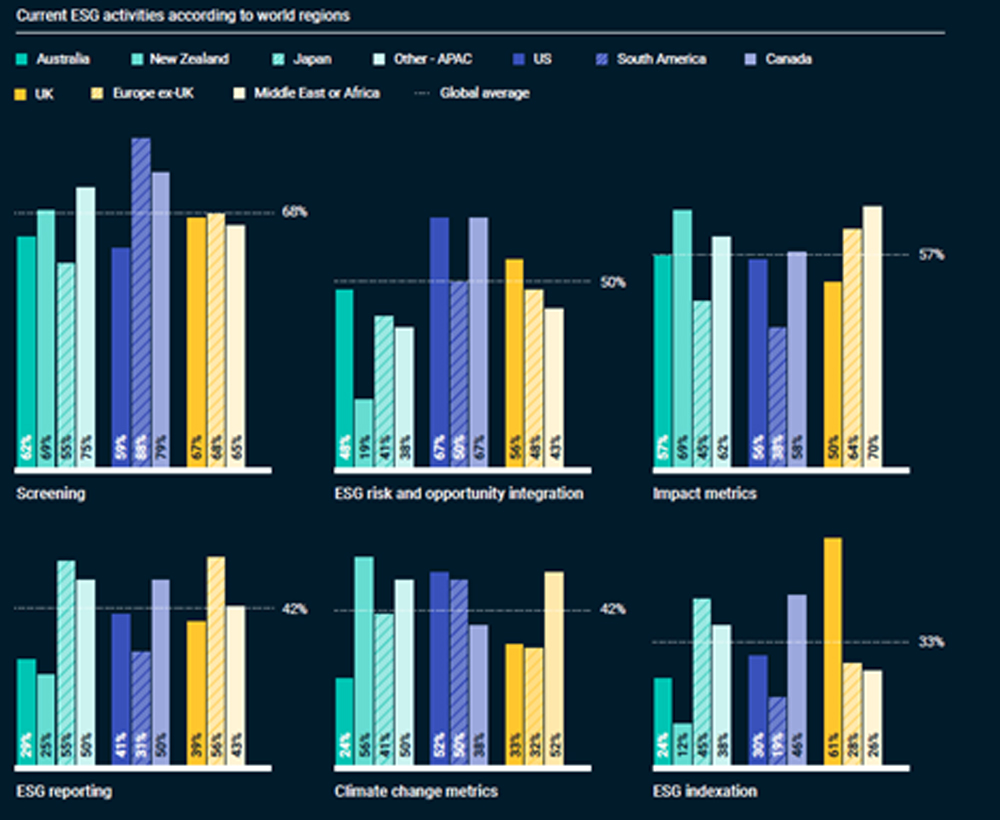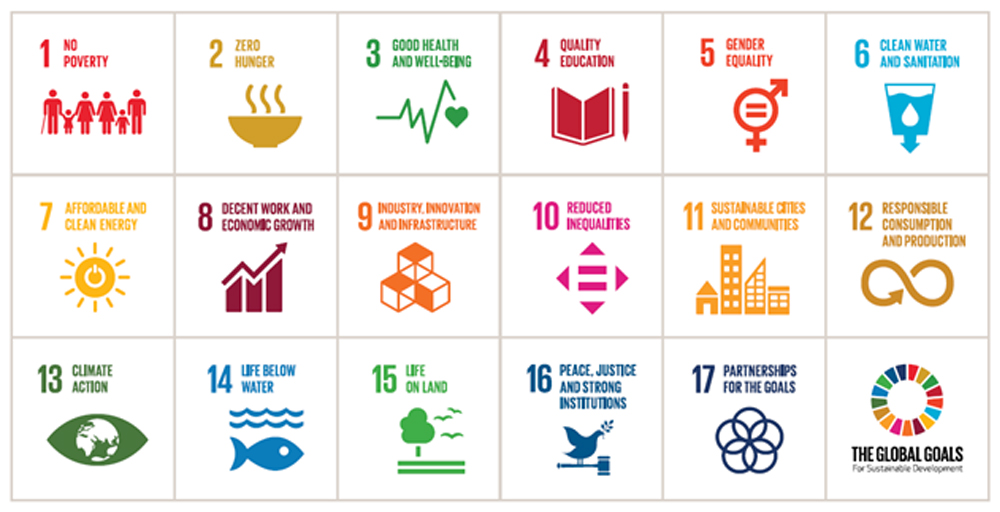Key highlights
- Investment portfolios based on sustainability tend to deliver better performance1 than those without sustainability considerations.
- Companies that fall short on sustainability present risks while companies that leverage on sustainability present opportunities for investors
- Government initiatives worldwide are making a strong push toward sustainable products, supply chains, services, business practices and economies.
- The sustainable investing universe is expanding as more and more companies are aligning with the 17 United Nations Sustainable Development Goals (SDGs) and are working toward well-defined targets.
Integrating environmental, social and governance (ESG) considerations into investment is no longer just a matter of values alignment but is quickly becoming a part of risk management to manage investment returns and, in some instances as part of alpha generation in targeting returns above benchmarks with additional risks loading.
In this aspect of the new imperative in investing, the E or environmental considerations in areas such as climate risk, water scarcity, extreme temperatures and carbon emissions are no longer seen as peripheral to economic growth, but rather tangible issues that can impact competitive positioning for businesses. On other words, their role as stewards of the natural or physical environment such as taking into account the utilisation of natural resources and the impact of their overall operations on the environment – locally and across its global supply chains; steps taken to reduce carbon emissions; precautions against environmental incidents such as oil spills or pollution from mining operations and safeguards against damage to reputation and shareholder value. But more importantly, their ability and corporate will to make the transitional leap while creating new opportunities for stakeholders and stockholders alike.
Figure 1: ESG has a positive impact on financial and investment performance in most cases

Sources: NYU Stern and Rockefeller Asset Management, February 2021
Multiple studies have found that ESG-driven companies and funds tend to perform better than those without an ESG dimension. The NYU Center for Sustainable Business and Rockefeller Asset Management studied more than 1,000 of these research papers from 2015-2020 and established a positive relationship between ESG and performance. The study found that in 58% of cases, there was a positive link with stock price, return on equity, return on assets and other corporate metrics. Only 8% had a negative link.
Where stock portfolios are concerned, 59% performed better than or similar to non-ESG portfolios, based on alpha, Sharpe ratio, and other risk-adjusted factors. Only 14% had a negative link between ESG and performance. The study, published in ESG and Financial Performance, also looked specifically at the relationship between climate change and low carbon approaches and investment performance. In 65% of cases, investments with climate and carbon considerations perform better than or similar to non-ESG funds.
Investors worldwide are shining a spotlight on environmental factors impacting their portfolios. Among the environmental issues that can materially affect companies’ growth and profitability, climate change stands out for investors. The 2021 Global Climate Survey conducted by Robeco, whose respondents account for 20% of global assets, found that 86% named climate change as a significant factor affecting their investment policy over the next two years; 81% think that renewable energy will drive decarbonisation and 66% said their decarbonisation focus will be on equities over the next two years.
In Asia Pacific ex-Japan, 50% of institutional investors already use climate change metrics in their investment, higher than the 42% global average, according to the MSCI Investment Insights 2021 Global Institutional Investor Survey.
Figure 2: Half of Asia-Pacific institutional investors use climate change metrics

Source: MSCI Investment Insights 2021 Global Institutional Investor Survey, January 2021
Environment-related investment risks and opportunities
Regulations and other governmental initiatives on carbon emissions and sustainability present both risks and opportunities for listed companies and bond issuers. The Singapore Budget 2021 includes higher petrol duties for vehicles with internal combustion engines while offering incentives for electric vehicles (EVs). China’s initiatives have spawned a rapid adoption of EVs. Several countries including China, India and the UK are looking to halt sales of fossil-fuel powered vehicles by 2040, while India plans to generate 40% of its power from solar sources by 2030. The European Union (EU) takes climate change so seriously that executive remuneration at 25% of major EU companies are linked to their progress in tackling climate issues2. For example, Cellnex Telecom, a wireless telecom operator with broadcasting infrastructure in Europe, began pegging 15% of its top management’s variable remuneration to ESG in 20203.
With these trends gaining momentum, companies in sectors that rely heavily on fossil fuels which are unable or slow to shift to more sustainable alternatives will come under pressure in the foreseeable future. These sectors include automotive, aerospace, coal mining, among others. What is encouraging is that some of these companies are already making the transition to the new realities. On the flipside, sectors such as EVs, natural gas, sustainable energy production and distribution, financial institutions funding sustainable initiatives, just to name a few, will likely see growth in the coming years.
Listed companies and credit issuers across a wide spectrum of industries ranging from mining to software are beginning to align with investors’ thinking, which means that the sustainable investment universe is expanding. More companies are integrating – or have clear intentions to integrate – sustainable practices and products into key parts of their organisations. They are among the more than 13,000 companies in 160 countries that are signatories of the United Nations Global Compact (UNGC), which helps businesses contribute positively toward some or all of the 17 United Nations (UN) sustainable development goals (SDGs) by 2030. The SDGs seek to alleviate poverty; hunger while promoting health and well-being, quality in education; gender equality; clean water and sanitation; affordable and clean energy; decent work and economic growth; industry, innovation and infrastructure; reduced inequalities; sustainable cities and communities; responsible consumption and production; climate action; life below water; life on land; peace, justice and strong institutions; and partnerships for the goals.
Figure 3: The 17 SDGs

Source: United Nations Sustainable Development Goals
Mitigating environmental risks
Being a signatory is not just a matter of lip service for groups such as Cellnex Telecom (Cellnex), which first aligned with the UNGC in 2015. Cellnex has an environmental management system which the group uses to evaluate risks to operations as well as impact on the environment. These efforts have resulted in 100% of energy consumption coming from renewable sources in Cellnex UK and Ireland, and direct greenhouse emissions offset for countries that Cellnex operates in and carbon footprint calculated in all countries in 2020. Cellnex Spain has also secured long-term renewable energy supply through power purchase agreements with embedded guarantees of origin. The group has an energy transition plan with well-defined targets such as 50% reduction in carbon footprint by 2030 and 100% reduction by 2050. Cellnex Italy is the first company in the group to have sustainability and social responsibility fully integrated into business processes and strategy with the aim of combining business growth and financial soundness with environmental and social sustainability.
Environmental sustainability is not just about climate change and carbon emissions. In the SDG framework, environmental integrity also includes clean water and sanitation, sustainable cities, responsible consumption and production, affordable and clean energy, life below water and life on land. The latter two relate to biodiversity and many companies have policies and activities addressing biodiversity. Cellnex Ireland, for example, has a few facilities on land originally owned by the state forestry body. Whenever Cellnex cuts a tree to install a facility on these sites, the company needs to plant a tree to comply with national policy. Given that about half of Cellnex’s sites are in protected areas, the group also uses environmental data to identify protected zones with the aim of safeguarding the biodiversity in those areas.
Better access to funding
More financial institutions are also embracing sustainability and have frameworks outlining which projects, companies and sectors they will or will not extend funding. The Spanish financial services group Banco Bilbao Vizcaya Argentaria (BBVA), for example, integrates environmental and social aspects into their due diligence4.
The group aims to have zero exposure to clients in the coal industry by 2030 in developed markets and 2040 worldwide. To meet that goal, BBVA’s environmental and social framework states that the bank will extend financial services to mining, energy, agribusiness and infrastructure companies or projects only if they meet specific environmental and social best practices. Taking mining as an example. BBVA recognises that it is an important sector because it produces raw materials that enable socioeconomic progress and the development of renewable energy systems. It requires potential mining clients to be transparent about their water use, waste management and greenhouse gas emissions, as well as have a transition policy toward sustainability.
In Asia, BBVA has extended its first working capital loan in the region to SK Innovation, a Korean energy company, in September 2020. The EUR100 million loan will go toward expanding SK Innovation’s EV battery manufacturing facilities in Europe, which are expected to impact the SDG goals of clean energy and sustainable cities.
This is the first in a series of articles on the E, S and G aspects of ESG investing. UOBAM became a signatory of the United Nations Principles for Responsible Investment (UNPRI) in January 2020.
Begin your sustainable investing journey with the United Smart Sustainable Singapore Bond Fund.
1Source: NYU Stern Center for Sustainable Business and Rockefeller Asset Management. "ESG & Financial Performance: Uncovering the Relationship by Aggregating Evidence from 1,000 Plus Studies Published between 2015-2020”, February 2021.
2Source: Factset as at 28 April 2021.
3Source: Cellnex 2020 annual report.
4Source: BBVA environmental and social framework, March 2021.
This publication shall not be copied or disseminated, or relied upon by any person for whatever purpose. The information herein is given on a general basis without obligation and is strictly for information only. This publication is not an offer, solicitation, recommendation or advice to buy or sell any investment product, including any collective investment schemes or shares of companies mentioned within. Although every reasonable care has been taken to ensure the accuracy and objectivity of the information contained in this publication, UOB Asset Management Ltd ("UOBAM") and its employees shall not be held liable for any error, inaccuracy and/or omission, howsoever caused, or for any decision or action taken based on views expressed or information in this publication. The information contained in this publication, including any data, projections and underlying assumptions are based upon certain assumptions, management forecasts and analysis of information available and reflects prevailing conditions and our views as of the date of this publication, all of which are subject to change at any time without notice. Please note that the graphs, charts, formulae or other devices set out or referred to in this document cannot, in and of itself, be used to determine and will not assist any person in deciding which investment product to buy or sell, or when to buy or sell an investment product. UOBAM does not warrant the accuracy, adequacy, timeliness or completeness of the information herein for any particular purpose, and expressly disclaims liability for any error, inaccuracy or omission. Any opinion, projection and other forward-looking statement regarding future events or performance of, including but not limited to, countries, markets or companies is not necessarily indicative of, and may differ from actual events or results. Nothing in this publication constitutes accounting, legal, regulatory, tax or other advice. The information herein has no regard to the specific objectives, financial situation and particular needs of any specific person. You may wish to seek advice from a professional or an independent financial adviser about the issues discussed herein or before investing in any investment or insurance product. Should you choose not to seek such advice, you should consider carefully whether the investment or insurance product in question is suitable for you.






